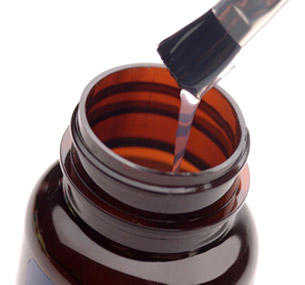It is any solid, liquid or gas that is known to be harmful to human health and the environment.
Household Hazardous Waste is accepted FREE of charge
Business – Agricultural – Commercial Hazardous Waste is assessed a FEE.
Ammunition and Explosives
Oil based paints, stains and varnishes are hazardous waste and should never be poured down the drain or placed in the garbage or recycling.
Keep items in original container and bring to the recycling center / transfer station for safe hazards disposal.
Visit the following link for FAQ’s on latex and oil disposal.
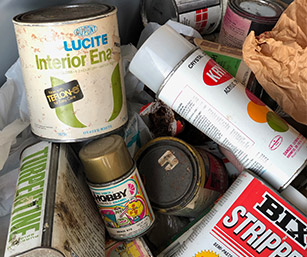
Latex paint is NOT HAZARDOUS WASTE. Latex paint cans can be disposed of in your garbage if they are dried out first.
ALL CANS MUST BE FREE OF RUNNING LIQUID BEFORE PLACING IN GARBAGE.
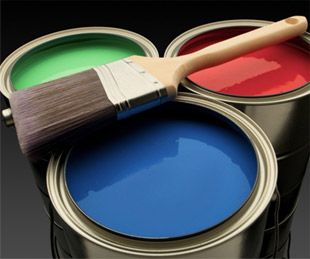
Household Aerosol Cans:
All EMPTY household aerosol cans can be placed in recycling.
Because all recycling is crushed, half full spray cans present the possibility of explosion. To protect our staff, bring cans with remaining product inside to the recycling center / transfer station for safe Hazards Disposal.
Spray Paint Aerosol Cans: Hazardous Waste ALL SPRAY PAINT AEROSOL CANS – REGARDLESS OF AMOUNT IN THE CAN – to the recycling center / transfer station for safe hazards disposal.
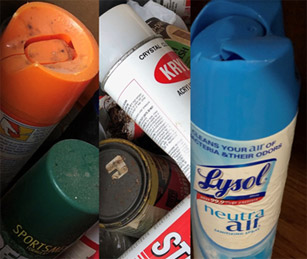
Sharps & needles are hazardous waste. DO NOT place in recycling or garbage, bring to the recycling center / transfer station for safe hazards disposal.
Pharmacies also provide collection of sharps. Check with your pharmacy for policy, availability and drop off location in store.
All sharps and needles MUST be placed in an FDA approved sharps disposal container, or in a heavy-duty laundry detergent bottle – securely taped shut and clearly labeled SHARPS.
Examples: needle, syringe, lancet, auto injector (EpiPen), infusion set and connection needle/set.
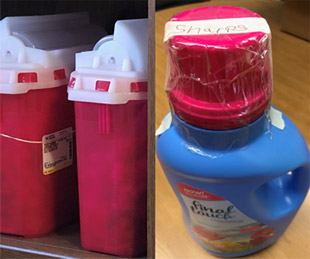
Batteries are the leading cause of fires in recycling centers and landfills across the country. When the battery casing is damaged it can/will spark or explode.
Rechargeable, lithium, lithium-ion, lead acid, nickel-cadmium and nickel metal hydride batteries are fire starters. They also contain chemicals that will harm humans, pets and contaminate land and waterways.
IF A BATTERY CASING IS PUFFED UP OR HAS CORROSION – FIRMLY DUCT TAPE THE BATTERY CASING CLOSED.
DO NOT place in recycling or garbage, bring to the recycling center / transfer station or to a designated collection site in your community. Sites can be found by selecting the Battery Collection Site tab.
Examples: hearing aid, greeting card, cell phone, mobile phone, laptop, power tool, camera, solar light, vaping & e-cigarette and all rechargeable batteries.
ALKALINE BATTERIES ARE NOT HAZARDOUS WASTE. Dispose of in garbage.
Examples: AAA, AA, C, D, 9V
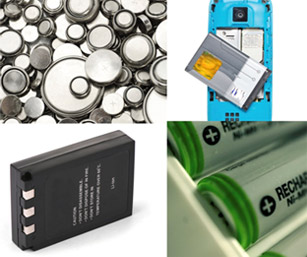
Compact fluorescent bulbs (CFL), high intensity discharge bulbs (HID), and light emitting diode (LED) bulbs are hazardous waste.
DO NOT place in recycling or garbage, bring to the recycling center / transfer station for safe hazards disposal.
INCANDESCENT LIGHT BULBS & HALOGEN ARE NOT HAZARDOUS WASTE. Dispose of in garbage.
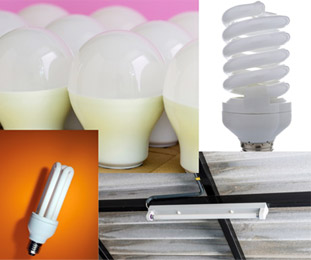
Pesticides, herbicides and fertilizers are hazardous waste.
Keep in original container. DO NOT place in garbage, bring to the recycling center / transfer station for safe hazards disposal.
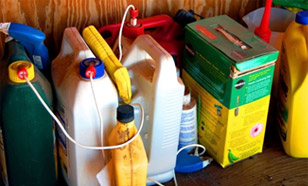
Motor oil, gasoline, diesel fuel, antifreeze and additives are hazardous waste.
Keep all materials in original container and bring to the recycling center / transfer station for safe hazards disposal.
DO NOT place in garbage, down the drain or on the ground.
*Waste oil not being collected at the Shelby County location at this time.
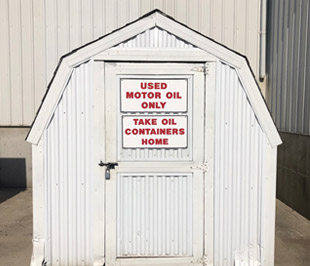
Most household cleaners contain hazardous chemicals that should never be poured down the drain or thrown in the garbage. Keep items in original container and bring to the recycling center / transfer station for safe hazards disposal.
Examples: oven cleaners, rust removers, drain cleaners, tub, shower and toilet bowl cleaners.
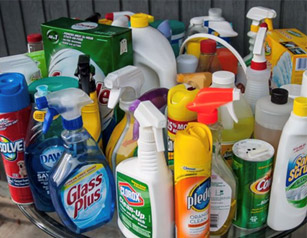
Keep in original containers and bring to the recycling center / transfer station for hazards disposal.
DO NOT place in recycling or garbage unless the bottle or can is completely empty.
